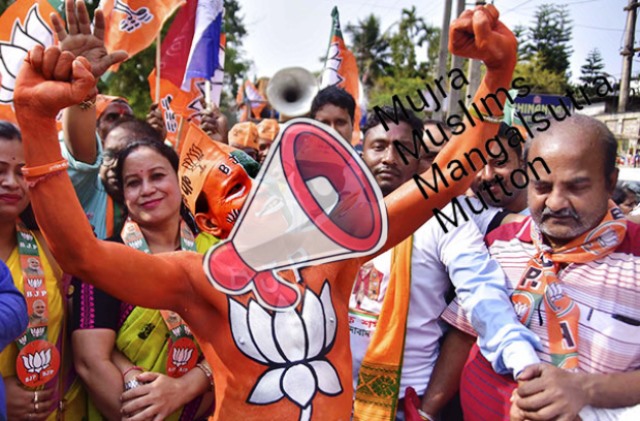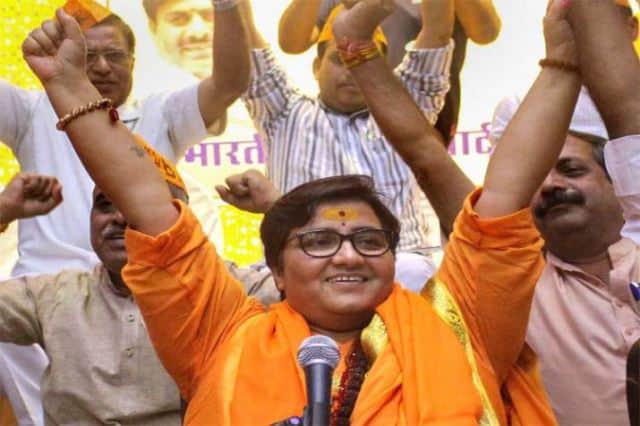He who fights with monsters might take care lest he thereby become a monster. And if you gaze for long into an abyss, the abyss gazes also into you.
– Fredrich Nietzsche
A certain obscure proposal is as obscure as the word coined: ‘Moditation’. That it should be added in the English language dictionary, surely, will not make the language richer. It’s like putting the man’s picture on a magazine cover, again and again. As editors, we compulsively avoided doing this.
The obsession with the camera, on many occasions, was witnessed when he visited a plethora of Hindu Gods. So much so, the Gods were often effectively sidelined. This is as much a reflection of an insecure childhood regression, as it is a repetitive act of crass, obsessive narcissism, to hide the deeper flaws in a man’s character.
And the flaws are not simply human flaws – some of them are soaked in the deliberate and documented enactment of collective nightmares of ordinary citizens of India, especially Muslims, in the blood and gore of genocides, as in Gujarat, 2002, and multiple mob-lynching; in the stoic silences of the our brilliant scholars, including opposition politicians, rotting in jails for years; in the everyday injustice which has stalked this unhappy land since the cursed summer of May 2014.
This M word has come to play, after all the other Ms used in this campaign by Mr M, including ‘Mujra’. Why ‘M for Monster’ was missing, would remain a mystery. ‘Mujra’ in Urdu and Hindi means salutations – paying one’s respect. It is also a metaphor for dancing girls of yore, who would dance on renditions from the finest Indian classical dances, with a feudal audience in rapt attention, who, were, often, the patrons of these forms of performing arts. Like the glorious and great life and times of Gandhi, a global icon since the freedom movement, which he has so predictably missed, of course, in Mr M’s ‘Entire Political Science’, even this word would have only a perverse meaning.
Like a fellow journalist cryptically commented on Saturday: “Perhaps he knows he has sinned, and sinned so much with not an iota of shame or introspection. That is why, this melodrama of one-day meditation with an army of cameras and security persons surrounding him. You just cannot eliminate your own past, can you? And where have you heard of meditation in front of so many cameras, situated on strategic angles, eyes-open-wide-shut? It’s morbid. Vivekananda would be turning in his secular grave!”
Many journos, for instance, are wondering: did he continue the so called meditation even in the thick of the tidal night, under flashlights and the cameras clicking continuously? Did he not eat and drink, or go to the washroom? Did he not think for once that his vote margin might be drastically reduced in Varanasi this time? Did he, or did he not, check, if the exit polls were ‘managed’ so that he can draw legitimacy in his final foray into power, till he joins the other Ms of his own making – the Margdarshaks – sidelined and dumped into the garbage can of BJP’s own dubious history?
Vivekananda famously said that you don’t have to do temple-hopping – you can find your God while playing in the football field! He said in one of his discourses: “…Then we shall understand that we ourselves are groping in darkness, and are leading others to grope in the same darkness, then we shall cease from sectarianism, quarrel, arid fight. Ask a man who wants to start a sectarian fight, ‘Have you seen God? Have you seen the Atman? If you have not, (then) what right have you to preach His name – you, walking in darkness, trying to lead me into the same darkness – the blind leading the blind, and both falling into the ditch’?”
If he wanted to turn the tide in the last phase of elections in Bengal on June 1, actually, he might lose all the nine seats going for polls on that day. Besides, the BJP might lose big in all the 13 seats in Punjab, and much of Himachal, UP and Bihar. In Varanasi, if he manages a victory with a reduced margin – that itself would signal the final collapse of his biological mythology.
Apart from the Ms, Muslim-bashing, and mythical buffaloes, he and his Man-Fridays did not raise one productive issue stalking the soul of India — farmers, MSP, students, science, health, inflation, mass employment, gender justice, women’s empowerment, the tens of thousands dead during the pandemic when they simply disappeared from the final data, including the dead floating and rotting on the sacred waters of a filthy Ganga. Did he actually clean up the Ganga, as promised, or was it only a fake promise in that fake stretch in the fake touristy terrain of Varanasi, where so many temples were destroyed?
In Varanasi, the city of genius shehnai player, Bismillah Khan, smoking a bidi, as humble as ever, who would play for Goddess Saraswati on the ghats, another counter-narrative is at play. Women have disliked his crude reference of ‘Mujra’. They also hated the public degradation of what is a private and sacred space for Hindu women in India – the ‘Mangalsutra’.
ALSO READ: Different Shades of India’s Electoral Canvas
It’s like how women in Bengal hated it unanimously when he so infamously ridiculed their woman chief minister in a rally: “Didi O Didi!” This thoughtless public speech boomeranged. Mahua Moitra instantly came on TV saying that this is exactly how street-side loafers behave in the towns of Bengal. Indeed, even women in BJP-backed households hated it, and voted against him.
Besides, two other crucial issues have become a bone of contention in Varanasi. One, all the fancy cash-rich projects here have gone to Gujarati contractors. Two, while they were mesmerized in the beginning by the grandiosity of it all, the destruction of many ‘prachin’ Hindu temples in their deeply religious space has gone down badly for the people here. Even the Hindu Mahasabha, for some inexplicable reason, seems to have gone against him. This is bad news for Mr M.
So, no real issues, for the PM. Congress president Mallikarjun Kharge summed it up: “Prime Minister Narendra Modi spoke about ‘mandir-masjid’ and other ‘divisive issues’ 421 times, referred to himself in the third person 758 times, referred to the Congress 232 times, and mentioned the INDIA bloc 573 times, but did not refer to the issue of unemployment and inflation even once in his election speeches in the past 15 days.”
A pained, former prime minister, Manmohan Singh, penned a letter to Punjab, before the final polls on January 1, in which he said that the current PM has indulged in the “most vicious form of hate speeches that are purely divisive in nature”. He said: “I have been keenly following the political discourse during this election campaign. Modiji has indulged in the most vicious form of hate speeches, which are purely divisive in nature. Modiji is the first prime minister to lower the dignity of public discourse, and thereby the gravity of the office of the prime minister.”
In contrast, none of the INDIA bloc leaders, even in their vehement criticism of the BJP, ever used a foul word, attacked any caste or community, or made personal remarks. They only raised crucial issues close to the heart of our suffering people, the deprived, marginalized, oppressed. They gave voice to the voiceless. They promised real, doable promises. They never said that they will make India a superpower, a trillion dollar economy, bring back black money from abroad, and will deposit Rs 15 lakh in every bank account. They also said that June 4 will mark the end of Mr M’s regime.
That would be the beginning of the end for a man drunk with power – who saw nothing but his own, artificially glorified, photo-shopped, self-image soaked in the eternal catharsis of narcissism. As Vivekananda said, and he never claimed himself to be prophet: … “You, walking in darkness, trying to lead me into the same darkness — the blind leading the blind, and both falling into the ditch.”
For more details visit us: https://lokmarg.com/

